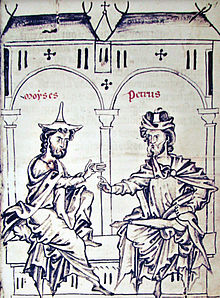RITVA PALMÉN & HEIKKI J. KOSKINEN
Forthcoming in Open Theology, De Gruyter, 2016.
Using interpretative resources from contemporary recognition theory with a special focus on the notion of mediated recognition, this paper discusses the nature and degree of methodological agreement as manifested in three twelfth-century dialogues. The first source to be considered is written by Gilbert of Crispin, and known as Disputatio Christiani cum Gentili (Disputation of Christian with a Pagan), ca. 1093.The second source was composed by the Christian convert Peter Alfonsi, whose dialogue Dialogi contra Iudaeos (Dialogue against the Jews) was written around 1110 (see the picture). The third source to be considered is Peter Abelard’s treatise Collationes, a dialogue with three participants and the narrator, written between 1127 and 1132.
In particular, the paper discusses the role of reason, the principles of argument, and the potentially shared set of rules these dialogues employ, thereby bringing the agreement among conflicting parties into focus. In this respect, the novel interpretative approach based on recognition theory also differs markedly from the standard reading of apologetic texts, which usually emphasizes conflict and disagreement.

